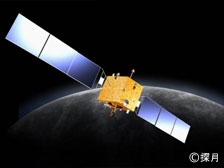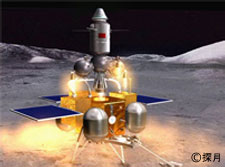Q. Your recent activities include projects with China. Can you talk about that? The world has welcomed China as another spacefaring nation in the last couple of years. Their human flights have gotten a lot of interest, sending a man to Earth orbit. We've been mostly interested in their lunar program. They have a series of three missions: first an orbiter, then a lander, and then an automatic sample return. China has shown strong government investment, new facilities, many young people working on the lunar missions. Currently, a lot of that capability is imported - they are having to buy specialty technical components for their spacecraft from other countries. But they're also developing a very strong indigenous capability in spacecraft development, and in science and exploration. I think one of the positive signs is that they're interested in such things as lunar and planetary exploration. That isn't a military decision. These are done for science, for exploration, and to advance the development of the country. And I think that's something we can all encourage, because it's a peaceful activity that allows countries to cooperate, and to compete on a friendly basis.
Q. How does China feel about international cooperation? When I met with the Chinese, they expressed strong desire for international cooperation. At the same time, it's clear they're developing a national program. They want to have their own independent capability for lunar missions. This seems to be a characteristic of all nations that are going to space. They don't want to be dependent on foreign sources. They want to use their own domestic talent, and train their own scientists and engineers. It's been made clear to me that China wants international cooperation that benefits their missions - not just for them to participate, but they want to improve their own capabilities as a result. This position is quite similar to Japan, which is developing its own capabilities for planetary exploration and lunar exploration. So I think the challenge in international cooperation is to introduce to these governments that it's okay to be dependent on each other a little bit. That's what happened with the Space Station. If it hadn't been for international cooperation and interdependence, it wouldn't have gotten built. The problem with the Space Station is that they didn't go far enough. Everybody is depending on just the United States' shuttle, and that's a really weak thing to depend on at this point. There should have been other plans for international cooperation that way. Q. Do you think China could be a partner of the U.S. in future space exploration projects, as Japan, Europe or Russia have been? I very much think that China could be a partner, and should be a partner in space exploration with the United States, and with other countries. It makes no sense to set up a split, either because you want to race them, or because you don't trust them. It's much better to involve them, so that you can develop cooperative relations. It will make the projects better, and it will make the relationships between the countries and the people better. The Planetary Society has experience in this. In the 1980s, the United States and Russia were not working together at all, and we began to cooperate on the Halley's Comet missions, and on Mars exploration. We began to bring our scientists over to Russia, Russia's scientists to the U.S., and we developed cooperative projects. And lo and behold, NASA followed. And by the 1990s, there was cooperation between the governments. I don't say we were responsible for it, but we can begin to push on it and develop the relationships beforehand. |
| 1 2 3 4 5 |

